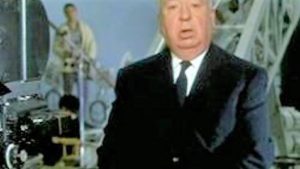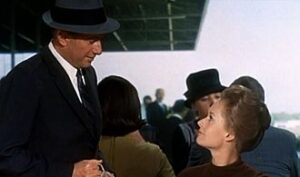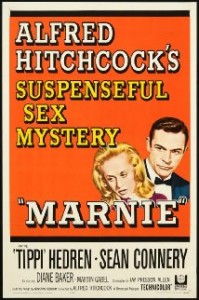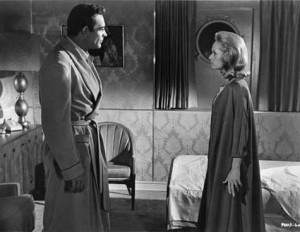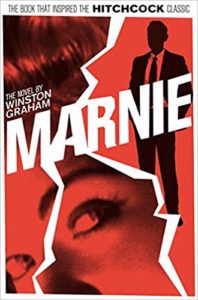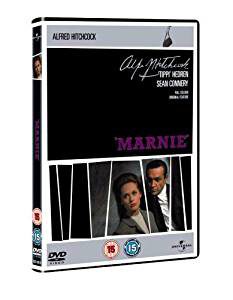Marnie ***** (1964, Sean Connery, Tippi Hedren, Diane Baker) – Classic Movie Review 154
It is easy to relish the charismatic characters of arch manipulator and lying thief, brilliantly played by the stylish star duo of Sean Connery and Tippi Hedren, in Alfred Hitchcock’s dark 1964 romantic thriller film Marnie.
Alfred Hitchcock’s American dark romantic psychological thriller film Marnie got some poor reviews in 1964 and was not a big hit. But it did have its admirers and was a moderate box office success, grossing $7 million in cinemas. Now it is easy to admire and enjoy the truly weird story, the beautifully-crafted scenes of suspense, the mounting atmosphere of tension and all the director’s flashy tricks. Perhaps best of all, it is especially easy to relish the unusual, charismatic characters, brilliantly played by the stylish star duo of Sean Connery and Tippi Hedren.
Connery plays Mark Rutland, an American company boss who hires an icy blonde secretary Marnie Edgar (Hedren), a cool customer indeed. Marnie turns out to be a compulsive liar and thief when Mark catches her red-handed and traps and blackmails her into a loveless marriage, which even ends up with him raping her on their honeymoon. He traps her like a frightened animal.
But his Freudian mission is now to save her, by hiring a detective to find out all about her troubled past and childhood. And once again in Hitchcock, it all comes back to the mother! Mark is at least as obsessive and compulsive as Marnie is – they are made for each other, the perfect couple! Question is, they are both sick but can they save each other and fall in love?
Connery, miles from James Bond and his usual macho persona, gives a devastating performance as a rich American urban male whose outward smoothness and confidence slowly erode to show the scared child inside. And the magnetic Hedren is astonishing in finding the soul beneath the sizzlingly beautiful outward shell.
Remotely based on the 1961 novel by Winston Graham, this disturbing study in obsession is a key Hitchcock work that reflects Hitch’s own obsessive feelings towards Hedren. It is a powerful, gripping, subversive personal project with links to Rebecca, Spellbound, Vertigo and Rear Window. All these years after it was made, it still seems modern and dangerous.
It starts with Marion Holland fleeing with the $10,000 she stole from the company safe of her employer, Sidney Strutt, the head of a tax consulting company, whom Mark Rutland, a wealthy widower who owns a publishing company in Philadelphia, meets on business and learns about the theft, recalling Marnie from a previous visit.
So it has links to Psycho too, with the heroine called Marion fleeing with money she stole her employer. Marion’s real name, though, is Margaret ‘Marnie; Edgar, and her fate is going to be very different from Marion Crane’s otherwise we would just have a remake. The style of the film is going to be very different too, more of an old-style melodrama, but with shocking modern trimmings, or you could call them psychological insights.
Another link to Psycho is that Hitchcock commissioned its screenwriter Joseph Stefano to work on the script in 1961. Stefano made extensive notes and wrote a 161-page treatment.
The director’s first choice to play the title role was Grace Kelly, by then Princess Consort of Monaco. But she withdrew from the project when the citizens of Monaco objected to her appearing in a film, especially as a sexually disturbed thief. This story is told in 2014’s Grace of Monaco with Nicole Kidman. High Society (1956) was Kelly’s last film.
After Kelly’s departure, Hitchcock abandoned work on Marnie to make The Birds (1963). When Hitchcock returned Marnie, Stefano dropped out because he was working on the TV series The Outer Limits. Evan Hunter, who had written the screenplay for The Birds, then developed Marnie with Hitchcock, and wrote several drafts. Hunter was unhappy with the rape scene in the novel, fell out with Hitch over it, and was dismissed from the project on 1 May 1963, replaced by Jay Presson Allen.
Bruce Dern (aged 28) makes his official film debut as the sailor from Marnie’s childhood at the end of the movie, after several years in TV and an uncredited bit part in Wild River (1960). He was rewarded with two different roles in TV’s The Alfred Hitchcock Hour, also in 1964.
The ever-resourceful Hitchcock made his money back after it was a success when it was re-released in a double bill with The Birds. Once again disloyally blaming his movie’s initial relative box-office failure on the actors, Hitchcock said: ‘I wasn’t convinced that Sean Connery was a Philadelphia gentleman. In a story of this kind you need a real gentleman, a more elegant man than we had.’
He made no complaints about his protégé Hedren, though. However, much later, she made plenty of complaints about him. She claimed Hitchcock made sexual overtures while making The Birds, and that he pressured her ‘sexually all the more blatantly, crudely, and cruelly’ while making Marnie.
Hitchcock and Connery got off to a bad start when the actor asked to see a script because he did not want to do another Hitchcock spy movie, but they got on well during filming, and the actor later said he was happy with the film ‘with certain reservations’.
Unusually looking to camera, Hitch makes his customary cameo early in the film (five minutes in) as a hotel guest walking nearby Marnie. entering from the left of a hotel corridor after Marnie passes.
Also in the cast are Diane Baker, Martin Gabel, Louise Latham, Bruce Dern, Alan Napier, Bob Sweeney, Milton Selzer, Henry Beckman, Edith Evanson, Mariette Hartley, S John Launer and Meg Wyllie.
Hitchcock noticed a great similarity in Herrmann’s scores for Joy in the Morning (1965) and Marnie, and thought Herrmann was repeating himself. Herrmann’s later score for Truffaut’s The Bride Wore Black (1968) repeats the main theme in Marnie, slightly altered in its harmony.
Bernard Herrmann is quotes as saying: ‘Alfred Hitchcock only finishes a picture 60 percent. I have to finish it for him.’ Maybe his is why they fell out.
Marnie is directed by Alfred Hitchcock, runs 129 minutes, is made by Universal Pictures, Geoffrey Stanley, Alfred J Hitchcock Productions, is released by Universal, is written by Jay Presson Allen, based on a novel by Winston Graham, is shot in Technicolor by Robert Burks, is produced by Alfred Hitchcock, is scored by Bernard Herrmann, and is designed by Robert Boyle.
It was the end of an era: the last time a Hitchcock blonde had a central role, and the last of Hitchcock’s collaborations with cinematographer Robert Burks, who died in 1968; editor George Tomasini, who died soon after Marnie’s release; and composer Bernard Herrmann, fired from Hitchcock’s next film, Torn Curtain (1966), when a pop-and-jazz-influenced score was preferred, either by Hitchcock or by the studio, or maybe both.
The cast are Tippi Hedren as Margaret “Marnie” Edgar, Sean Connery as Mark Rutland, Diane Baker as Lil Mainwaring, Mark’s former sister-in-law, Martin Gabel as Sidney Strutt, Marnie’s ex-boss, Louise Latham as Bernice Edgar, Marnie’s mother, Bob Sweeney as Mark’s cousin Bob, Milton Selzer as man at track, Mariette Hartley as Susan Clabon, Marnie’s co-worker, Alan Napier as Mr Rutland, Mark’s father, Bruce Dern as the sailor from Marnie’s childhood, Henry Beckman as the first detective, S John Launer as Sam Ward, Edith Evanson as Rita, Meg Wyllie as Mrs. Turpin, Kimberly Beck as Jessica “Jessie” Cotton, Melody Thomas Scott as young Marnie, and Alfred Hitchcock as a hotel guest.
http://derekwinnert.com/north-by-northwest-classic-film-review-4/
© Derek Winnert 2013 Classic Movie Review 154
Link to Derek Winnert’s home page for more film reviews: http://derekwinnert.com/

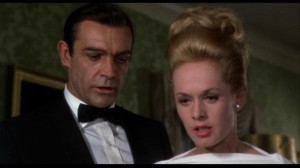


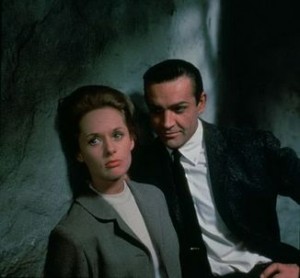

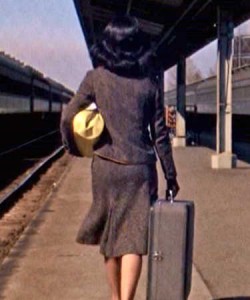
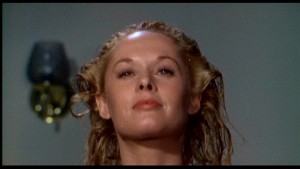
![Cameo-Marnie[1]](http://derekwinnert.com/wp-content/uploads/2013/09/Cameo-Marnie1.jpg)
